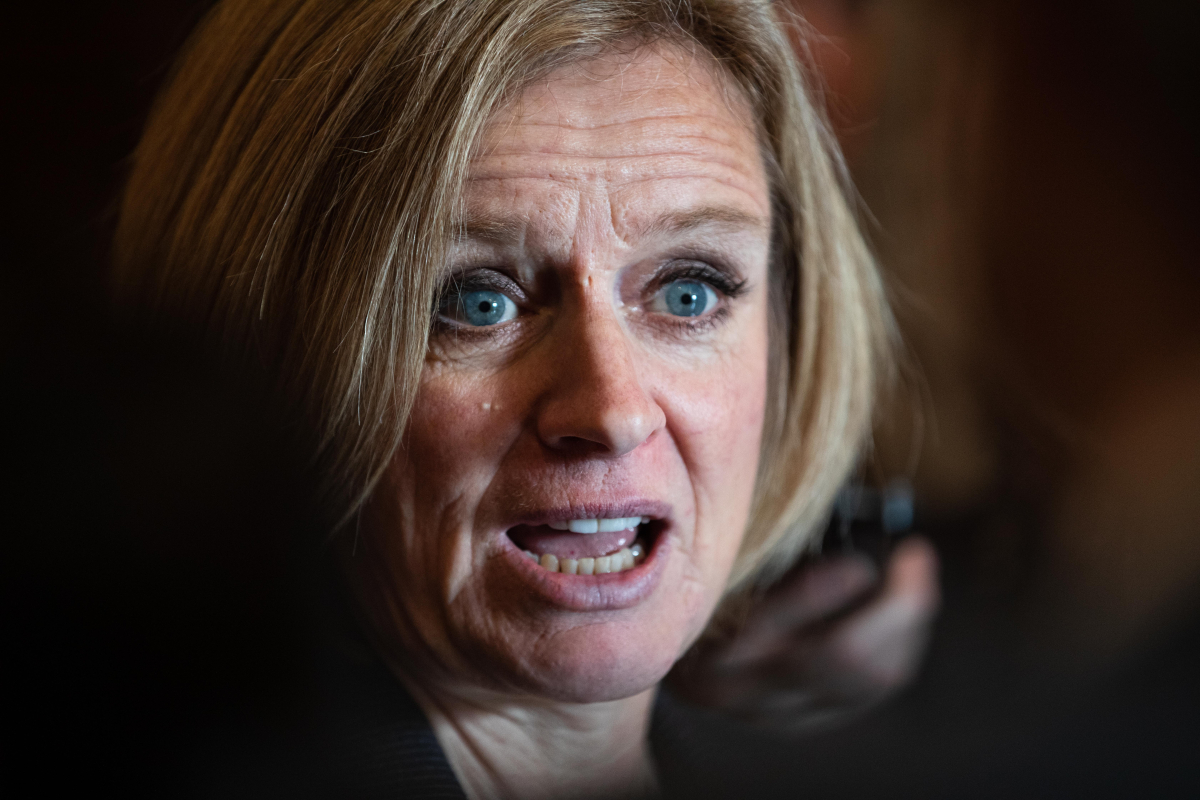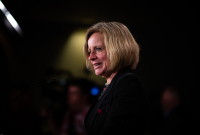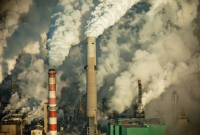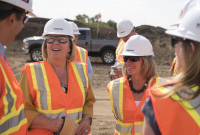Support strong Canadian climate journalism for 2025
Alberta Premier Rachel Notley has announced her government is imposing cuts to oil production in the province.
The premier announced the news in a live address to the province on Sunday evening. It was a widely expected move to address what the government and its official Opposition say is costing the province hundreds of millions of dollars in losses due to global market prices.
The proposed cuts would take effect beginning in January 2019, and will cut production initially by 325,000 barrels per day. This cut amounts to a roughly 8.7 per cent reduction, the government said, as Alberta currently produces 3.7 million barrels per day of raw crude and bitumen.
Notley said the production cuts would reduce the price gap on the market, one that is punishing Alberta, by about $4 per barrel and allow the government to increase its own revenues by $1.1 billion in 2019-20. Officials say the province is producing 190,000 barrels per day more than it can ship by pipeline, rail or truck, and its storage tanks are now essentially filled.
“Every Albertan owns the energy resources in the ground, and we have a duty to defend those resources," Notley said in her address. "But right now, they’re being sold for pennies on the dollar. We must act immediately, and we must do it together. I can’t promise the coming weeks and months will be easy, but I can promise we will never back down in our fight to protect jobs and the resources owned by all Albertans. I will never stop fighting for Alberta.”
After its excess storage is drawn down, a process Alberta expects to last roughly three months, the province anticipates lowering the amount being cut each month to around 95,000 barrels a day, and from then on it will undergo a monthly recalculation in order to match capacity with production.
The curtailment will be applied to each operator, as opposed to each individual oil well, so as to allow the company to determine which project it can alter to implement its cut.
The rules implementing the cut will allow it to last until Dec. 31, 2019, but the curtailment could be halted sooner depending on the market. Notley is also expecting additional rail capacity to come online in the fall. The premier said recently she is prepared to buy 80 locomotives and as many as 7,000 railcars to move 120,000 barrels of oil a day.
The provincial government's calculations are based on a private sector report produced by Scotiabank that is considered to be riddled with errors, according to economist Robyn Allan. In a recent analysis, published by National Observer, Allan, a former chief executive officer of the Insurance Corporation of British Columbia, wrote that some integrated companies that operate in Alberta are actually profiting from the low market prices, such as Imperial Oil, Suncor and Husky, since they can buy the lower cost oil for their refineries.
Many companies also have locked in contracts that protect them from the gap that exists on the markets.
Kenney praises Notley on cuts decision
Both the government and Opposition United Conservative Party say Alberta is losing money because the markets are paying far less for the province's crude oil than what they pay for oil from other jurisdictions. They have also claimed that many mid-sized and smaller companies are being forced to lay off workers because the price gap is making it difficult for them to compete.
UCP Leader Jason Kenney has urged Notley to impose the production cuts in order to protect Alberta companies and save jobs.
“Today’s decision was a necessary one," Kenney said in a response Sunday evening after the premier spoke. "I commend the government for having reached out and listened to industry."
The opposition leader said it was an "important demonstration on how we can work across party lines." He gave credit to Notley for being "willing to listen to, and take advice from, the opposition," saying he had held an hour-long conversation with her officials on the issue last week.
Kenney added that it was "more important than ever" to make sure the Trans Mountain pipeline expansion project, which had its construction halted by the courts, and the Keystone XL pipeline, which is facing another environmental review, are built.
Oilpatch firms Cenovus Energy and Canadian Natural Resources Ltd. had called for a production cut. On Sunday, Cenovus President Alex Pourbaix said Notley had taken a “difficult but necessary decision,” and that Kenney and Notley’s “rise above partisan politics” was encouraging.
“Under normal circumstances, oil and gas producers would never advocate for government intervention in the market, but these are not ordinary circumstances,” reads the statement by Pourbaix.
Neither Notley, nor Kenney elaborated on the challenge of climate change in their remarks on Sunday evening.
Scientists say that humanity must dramatically scale back its production and consumption of fossil fuels such as oil, gas and coal, in order to prevent the planet from warming to levels that would cause significant and irreversible damage to ecosystems and the economy.
A recent assessment by the Intergovernmental Panel on Climate Change said that the planet had less than 12 years to take action to reduce carbon pollution and prevent a significant increase in the risk of severe floods, droughts, extreme heat and poverty.
'We share Alberta’s frustration,' says Sohi
The Trudeau government introduced Bill C-69, its overhaul of Canada's approval process for industrial projects, in response to concerns that the previous Harper government had rigged Canada's environmental laws to reduce oversight and favour industry.
Two major pipeline projects, the Trans Mountain expansion and Enbridge's Northern Gateway pipeline saw their approvals quashed by the courts due, in part, to mistakes made when the Harper government was in power. The Federal Court of Appeal also said in August that the Trudeau government had failed to adequately consult the First Nations directly affected by the Trans Mountain expansion project, prior to its approval in November 2016.
The federal review of a third major project, the Energy East pipeline, was suspended due to a conflict of interest scandal caused by a private meeting staged by Harper-appointed members of the federal pipeline regulator, the National Energy Board. Energy East was later abandoned by its proponent, TransCanada, so that it could focus on plans to pursue the Keystone XL pipeline.
Alberta later promised to subsidize the Keystone XL project, by buying space as a shipper on that proposed pipeline, which is slated to go the Gulf coast of Texas. The federal government has also spent $4.5 billion to buy the existing Trans Mountain system and the rights to the expansion project in order to ensure that it can proceed.
Natural Resources Minister Amarjeet Sohi, who has been part of a working group with Alberta and Saskatchewan analyzing transport and refinery options for oil, said Sunday that while the government is "seeing some progress" on addressing the price gap with more rail transport and U.S. refineries coming back online, it will continue to take action on addressing the issue.
“Today the Government of Alberta made an important decision that they have determined to be in the best interest of Albertans. We share Alberta’s frustration at the ongoing and unacceptable discount and we have been clear, the status quo cannot continue,” he said in a statement released by press secretary Vanessa Adams.
“The fact is, our government inherited a flawed system that led to projects going before the courts rather than getting shovels in the ground. Our government has been taking steps since day one to ensure that good projects can move ahead by making the issue of market access a priority.”
Meanwhile, federal Conservative Party leader Andrew Scheer responded to Notley's announcement with a statement that attacked Prime Minister Justin Trudeau's "failures on several major pipeline projects" and called for a range of measures, including the cancellation of a planned federal price on carbon pollution, as well as the scrapping of Bill C-69.
"Premier Rachel Notley’s drastic and extraordinary announcement this evening lies squarely at the feet of Justin Trudeau," said Scheer.
"This crisis was created by the federal government and it alone has the power to fix it. I repeat my call for Justin Trudeau to kill the no-more-pipelines Bill C-69, cancel his carbon tax, and end the shipping ban in British Columbia. Further, he must establish firm approvals timelines, invoke constitutional authority to build major projects, and eliminate foreign interference in the approvals process. If he does not take these immediate steps, he will be even more responsible than he already is for the crisis in the energy sector."
Editor's note: This article was updated on Dec. 2, 2018 at 9:10 p.m. ET to include reaction from Kenney and Scheer. It was updated again at 10:20 p.m. ET with additional comments from Amarjeet Sohi and other background information.






Comments
While I'M fine with that, Robyn Allan makes clear that from HER perspective (and Kenney boy's) it's deluded, or perhaps knowingly doing harm just to intensify her scaremongering. It's amazing how far politicians will go enacting stupid policies that hurt their own constituents just because they're doubling down on their own spin. At least for Notley it is in some way consistent with her professed ideology--nothing wrong with a New Democrat interfering in markets. But for Kenney boy to support it is yet more proof of how incredibly shallow the professed Conservative commitment to markets is. They're not remotely committed to markets, they're committed to rich people, with "markets" as a convenient fig leaf because nobody would vote for them if they admitted oligarchy's what they're all about.
Well, whatever. If Alberta wants to score an "own goal" by reducing greenhouse gas emissions only to find that nobody else's sky falls when they do, that's fine by me.
Trudeau and Notley are bankrupting Canada. Cut taxes, subsidize fossil fuel companies, and purchase assets that are 100% in conflict with stated climate goals. This kind of behaviour by our governments is worse than corporate obstruction.